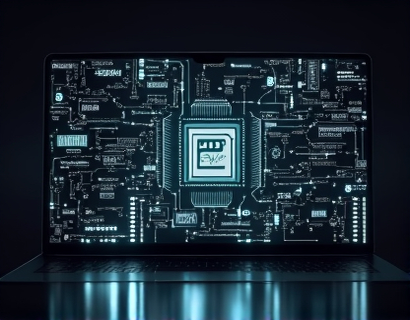Unlocking Anonymous Excellence: Cutting-Edge Pseudonym Software for Secure Blockchain and AI Operations
In the rapidly evolving landscape of technology, the need for robust privacy solutions has become paramount, especially in the realms of blockchain and artificial intelligence. As these technologies continue to transform industries, ensuring secure and anonymous operations has emerged as a critical concern. This article delves into the innovative software solutions designed to create and manage secure pseudonyms, enabling users to conduct blockchain and AI operations with enhanced privacy and compliance.
The concept of using pseudonyms in digital interactions is not new, but the application of this principle in blockchain and AI environments is revolutionizing how we approach digital privacy. Pseudonyms serve as a layer of anonymity, allowing individuals and entities to engage in transactions and interactions without revealing their true identities. This is particularly crucial in the blockchain space, where transparency and anonymity often walk a fine line. The integration of advanced pseudonym software ensures that users can leverage the benefits of blockchain technology while maintaining their privacy.
One of the primary challenges in blockchain and AI operations is compliance with regulatory standards. Governments and regulatory bodies worldwide are increasingly focusing on data protection and privacy, imposing stringent requirements on digital transactions. Traditional methods of ensuring privacy often fall short in the face of these regulations, leading to potential legal and security risks. The solution lies in sophisticated pseudonym software that not only anonymizes identities but also ensures adherence to regulatory frameworks.
These cutting-edge software solutions are expertly designed to create and manage secure pseudonyms, providing a robust framework for anonymous operations. The technology behind these platforms is multifaceted, incorporating advanced cryptographic techniques, decentralized identity management, and real-time compliance monitoring. By leveraging these technologies, users can engage in blockchain and AI activities with confidence, knowing that their privacy is safeguarded and their actions are compliant with legal standards.
The architecture of these pseudonym software solutions is built to offer seamless integration with existing blockchain and AI systems. This ensures that users do not have to overhaul their current infrastructure to adopt these privacy-enhancing tools. Instead, the software can be easily integrated into existing workflows, providing a smooth transition to enhanced privacy and security. The user-friendly interface and intuitive design make it accessible even for tech-savvy individuals who may not be experts in cryptography or regulatory compliance.
One of the key features of these pseudonym solutions is their ability to generate unique and unpredictable pseudonyms for each transaction or interaction. This level of uniqueness makes it extremely difficult for third parties to trace activities back to the user's real identity. The pseudonyms are created using complex algorithms that combine elements of cryptography and randomization, ensuring that each pseudonym is as distinct as possible. This approach not only enhances privacy but also adds an additional layer of security against potential attacks.
Moreover, these software solutions are designed to adapt to the dynamic nature of blockchain and AI environments. As new protocols and standards emerge, the software can be updated to maintain compatibility and effectiveness. This flexibility is crucial in an industry where technology evolves at a breakneck pace. Users can rest assured that their privacy tools will remain relevant and effective, even as the landscape changes.
Compliance with regulatory standards is a cornerstone of these pseudonym solutions. The software is engineered to monitor and enforce adherence to various privacy laws and regulations, such as the General Data Protection Regulation (GDPR) in the European Union and the California Consumer Privacy Act (CCPA) in the United States. By integrating compliance checks into the pseudonym generation and management process, these tools help users avoid legal pitfalls and ensure that their operations are in line with regulatory requirements.
Another significant advantage of using advanced pseudonym software is the enhancement of trust in digital transactions. In the blockchain ecosystem, trust is a fundamental component, and the ability to conduct transactions anonymously without compromising security can significantly boost user confidence. When users know that their identities are protected and their actions are compliant, they are more likely to engage in blockchain and AI activities, fostering a more robust and vibrant digital economy.
For individuals and organizations operating in the blockchain and AI space, the benefits of these pseudonym solutions are manifold. Enhanced privacy allows for more open and honest interactions, reducing the risk of identity theft and other malicious activities. The ability to maintain anonymity while complying with regulations also opens up new opportunities for innovation and collaboration. Developers can focus on creating groundbreaking applications without the constant worry of legal and privacy issues.
From a technical standpoint, the pseudonym software employs a range of advanced features to ensure secure and efficient operations. One such feature is the use of zero-knowledge proofs, a cryptographic method that allows one party to prove to another that a statement is true without revealing any information beyond the truth of that statement. This technology is particularly useful in verifying transactions and interactions without exposing sensitive information, further enhancing the anonymity and security of the operations.
Additionally, the software incorporates decentralized identity management systems, which empower users to control their digital identities entirely. This decentralized approach eliminates the need for centralized authorities to manage identities, reducing the risk of single points of failure and increasing overall system resilience. Users can generate, manage, and revoke pseudonyms as needed, giving them full control over their digital presence.
The integration of machine learning and artificial intelligence in these pseudonym solutions also plays a crucial role. AI algorithms can analyze patterns and detect anomalies in real-time, providing an additional layer of security against potential threats. These intelligent systems can adapt to new patterns of behavior, ensuring that the pseudonyms remain effective even as attackers become more sophisticated.
For tech-savvy individuals in the blockchain and AI space, adopting these pseudonym solutions can be a game-changer. The software is designed to be highly customizable, allowing users to tailor the level of anonymity and compliance to their specific needs. Whether you are a developer building decentralized applications, a trader engaging in cryptocurrency exchanges, or a researcher working with sensitive data, these tools can be adapted to fit your unique requirements.
Furthermore, the user community surrounding these pseudonym solutions is growing rapidly. A vibrant ecosystem of developers, researchers, and users is continuously contributing to the improvement and expansion of the software. This community-driven approach ensures that the tools remain at the forefront of technological innovation, addressing emerging challenges and incorporating new features based on user feedback.
In conclusion, the advent of advanced pseudonym software represents a significant leap forward in ensuring secure and anonymous operations in the blockchain and AI domains. These solutions not only provide robust privacy but also ensure compliance with regulatory standards, making them indispensable tools for anyone involved in these cutting-edge technologies. By embracing these innovative tools, users can navigate the complex digital landscape with confidence, knowing that their privacy and security are paramount.










































